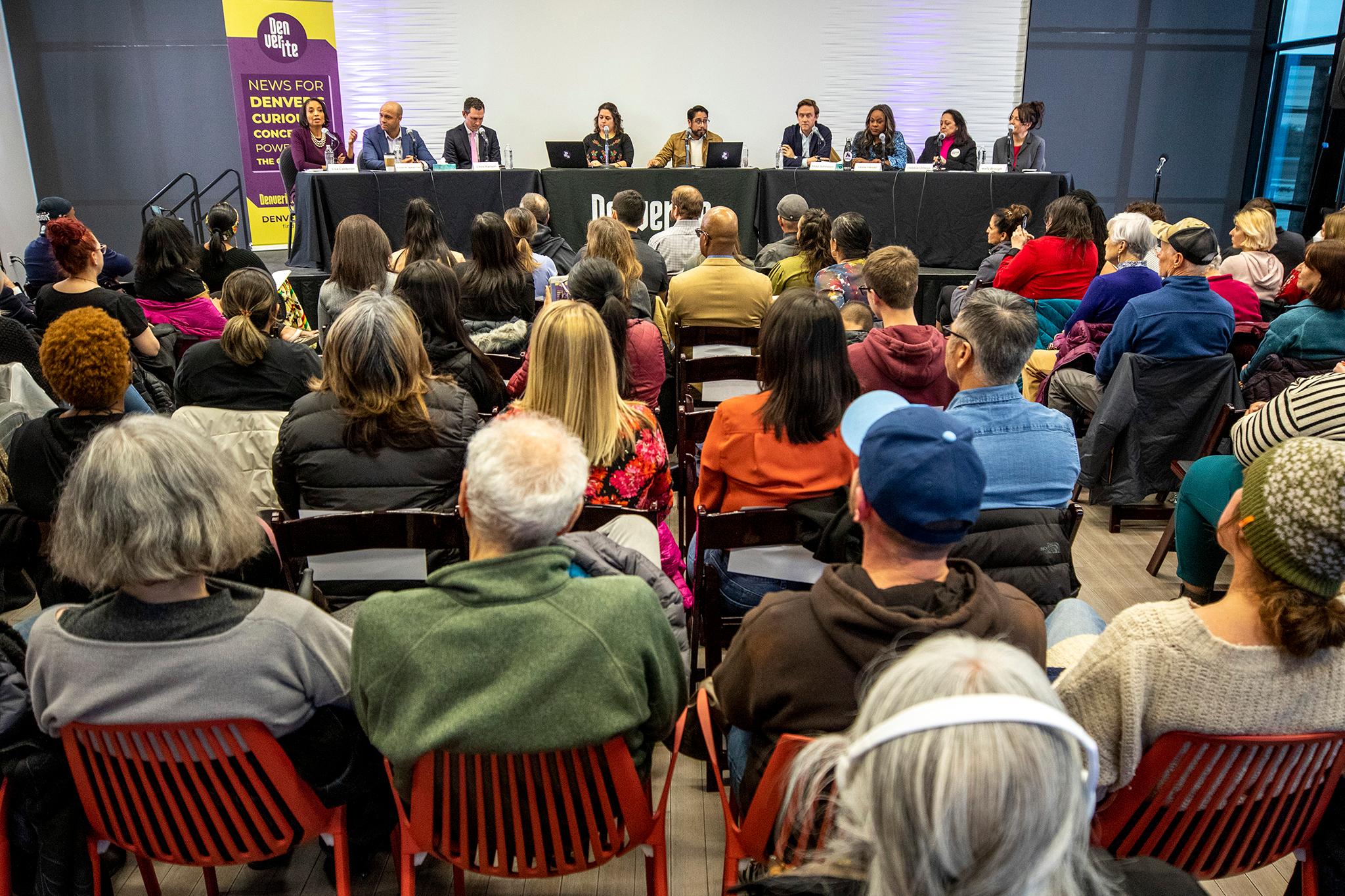Denverite's People's Forum, a discussion shaped by questions from organizations led by people of color throughout the city, veered into a debate, as seven of the mayoral candidates on the ballot tackled questions around equity, addressing homelessness, health solutions and many other top issues for marginalized Denver communities.
The candidates selected to participate had raised the highest number of Fair Elections Fund dollars, signaling significant support from Denver voters.
On the stage: former Denver Metro Chamber of Commerce head Kelly Brough, State Rep. Leslie Herod, State Sen. Chris Hansen, former state Sen. Mike Johnston, City Councilmember Debbie Ortega, Tattered Cover Owner Kwame Spearman, and Lisa Calderón, a criminal justice advocate and professor and head of Emerge Colorado, a group working to get Democratic women elected to office.
Here's a look at how the discussion among candidates that made up the bulk of the forum played out Tuesday night.
The forum was hosted by Colorado Public Radio hosts May Ortega and Nathan Heffel, with help from Denverite's neighborhood reporter Desiree Mathurin and editor Obed Manuel.
Manuel set the tone for the forum reminding voters that whoever is picked to lead the city will address the big issues Denverites are thinking about: public safety, housing, homelessness, affordability, growth and transportation.
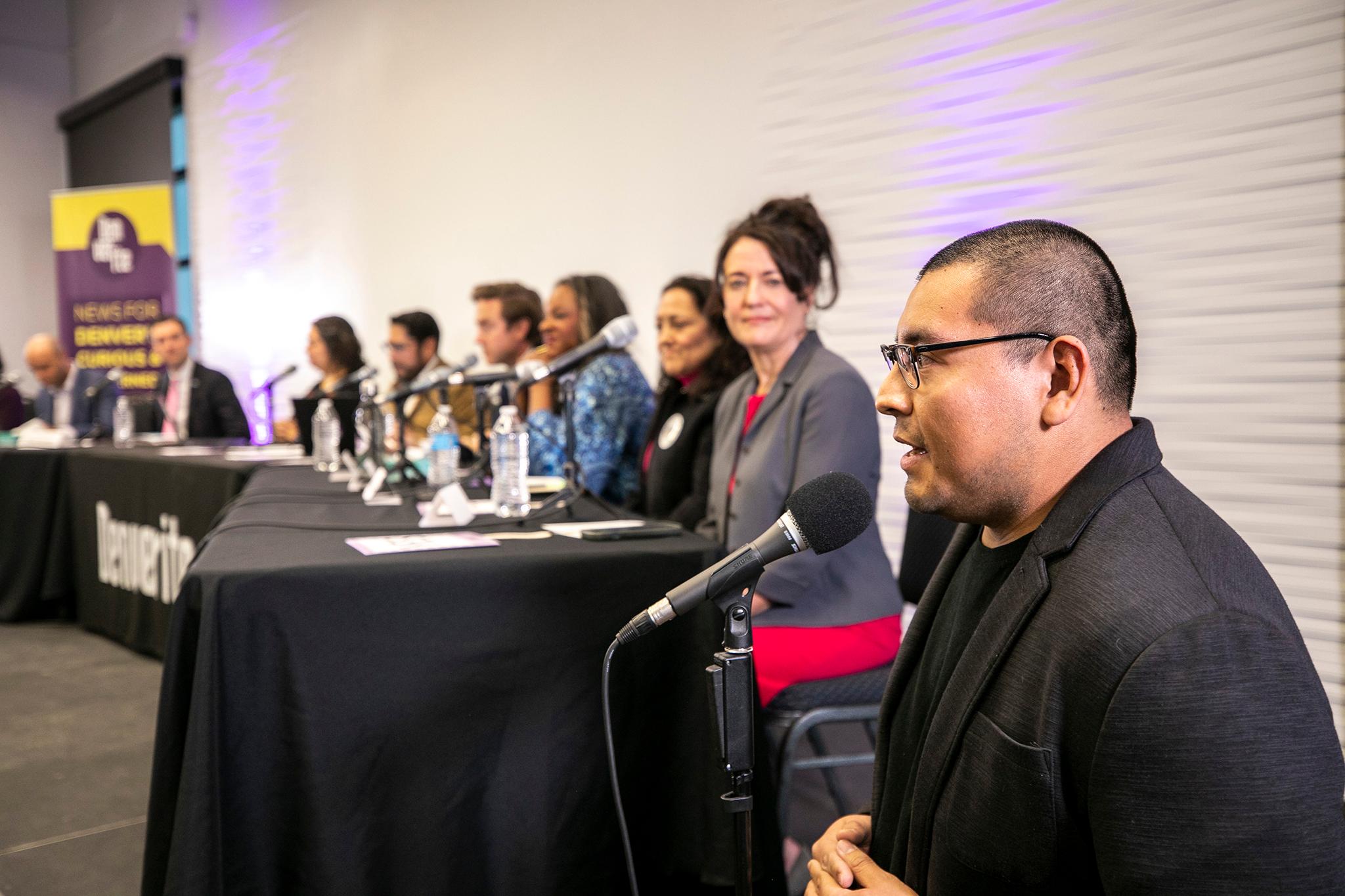
"I'm gonna look at the candidates when I say this," Manuel said. "The person who wins the election has the responsibility of making sure that your policies work for everyone."
Candidates were asked to define equity and how they would practice it as mayor.
"Equity means giving everybody what they need -- exactly what they need when they need it," Calderón said. "And so that is different from equality, where you give everybody the exact same thing. Not everybody needs the exact same thing."
On equity, Spearman said, "You have to live it." He he said he's done that at Tattered Cover -- a bookstore chain he took over toward the end of 2020.
"We actually didn't ask ourselves at Tattered Cover: How do we become more diverse?" he said. "What sort of equity goals do we need? What we did is we created an environment in which everyone was welcome. We had leadership that was representative of the types of people that we wanted. We did things like we encouraged different ethnicities, different types of people who have disabilities to become a part of our organization, and we cherished them."
Creating equity involves more than rules, numbers and quotas, he said. "You need to see if that person actually walks the walk and has been in an environment in which they've lived and breathed equity."
Last year, Denverite reported extensively on turbulence during Spearman's first year at the helm.
Hansen said he basically agreed with Calderón's definition of equity.
"I think I've lived these values of getting the folks the things they need -- not in the sense of everybody gets the same thing," he said.
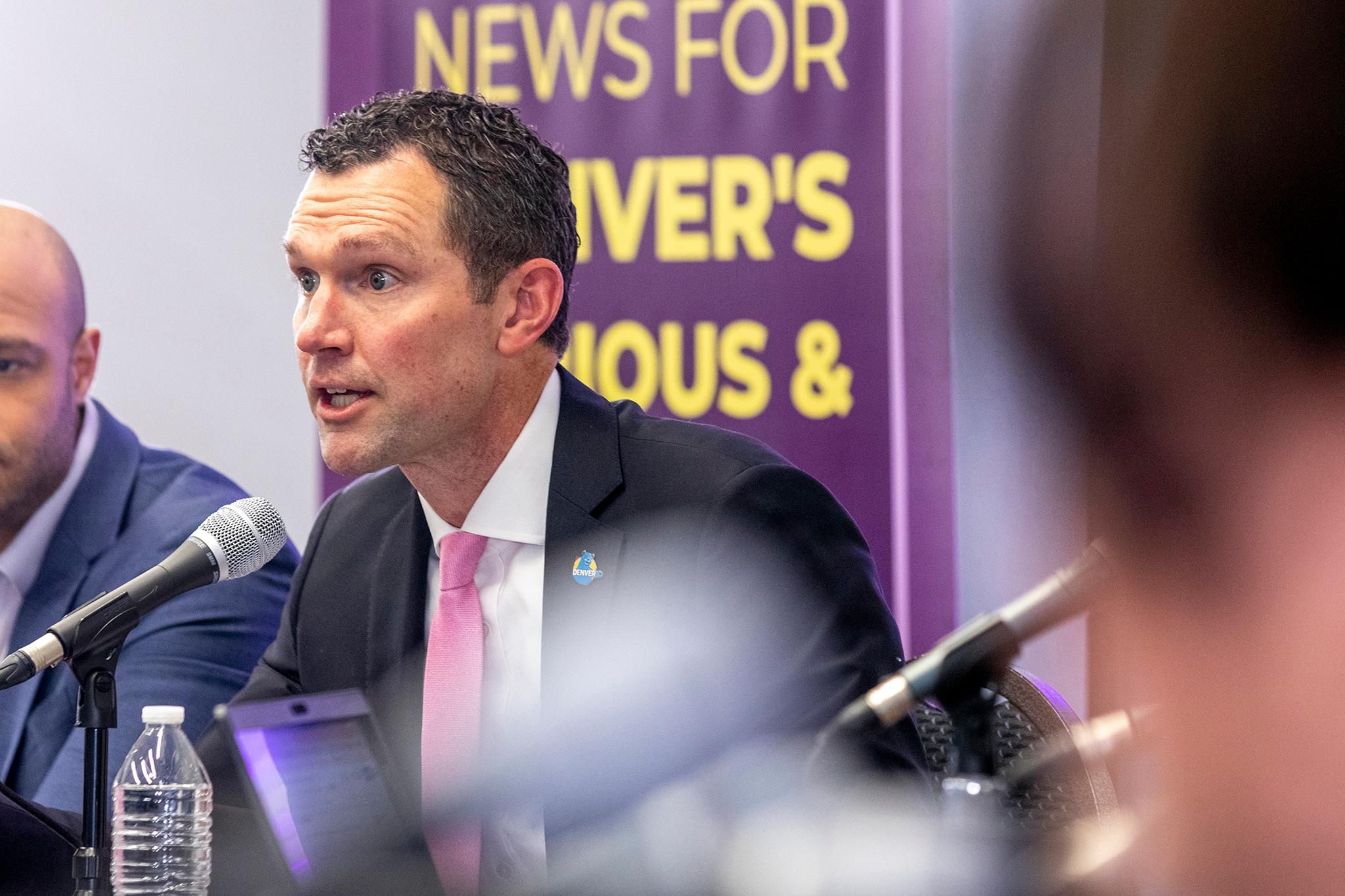
He pointed to working on expanding Colorado's Earned Income Tax Credit and the child tax credit, passing policy to ensure undocumented workers have unemployment insurance benefits and property tax relief for low-income families.
Johnston expanded on Calderón's definition of equity and added that leaders create it by ensuring a leadership team "represents diverse backgrounds and voices" and is "carefully attuned to what communities need and how to take action on that."
He cited his work as the CEO of Gary Community Ventures, which built COVID Check, where vaccines and tests were administered. When the organization realized communities of color were lacking access to testing and vaccines, the program invested several million dollars into mobile vaccine labs to ensure communities of color had access.
Defining equity is one thing, but leading with equity is another, Herod said. "I have often witnessed when people come to the table and say they believe in equity, but when it comes to actually doing the work or stepping up, it doesn't show up."
She pointed to making infant mortality policy more gender-inclusive as an example of leading with equity. She also addressed how creating a legislative package to support minority businesses meant more than just giving money. It also meant building a program to ensure inclusion.
For Ortega, practicing equity comes down to resources.
"What this means is making sure that the budget that the city has translates into how we address communities that have been left behind," she said. "We still have neighborhoods in our city that don't have a basic standard of infrastructure. They're still fighting for curbs, gutters, sidewalks."
One of her solutions was sending people in Mayor Michael Hancock's administration to Seattle to learn about that city's race, social justice, inclusion and equity program. Those people returned to Denver to train city staff on best practices.
"Now we have every agency incorporating those issues into our budget in addressing especially our neighborhoods that have been left behind," she said. "So for me, it's doing things like food access, and making sure that the healthy food for kids program that we have is addressing the need where it is."
When Brough thinks of equity, she focuses on "equity of outcomes." She created Prosper Colorado, while at the Denver Metro Chamber of Commerce. The program addressed racial disparities in income, homeownership and access to starting a business.
"For me, equity is about: You remove the ethnic inequities in our economy," Brough said.
Denver has seen rents skyrocket and Black families be displaced in "a hostile housing environment." How would candidates ensure residents could live with dignity in Denver?
"I think we have to stop expecting that developers can build the product we most need for our residents to be able to live," Brough said. "So I would focus on building that product myself as your mayor."
She would do so on publicly owned land like surface parking lots at rec centers, libraries, police stations, fire houses and in partnership with Denver Public Schools and RTD. She described all that public property as "a land bank."
"Building on that land reduces the cost immediately of the homes we put on it," Brough said.
Ortega's approach would be regional. She spoke about building manufactured housing on publicly owned land near transit across the metro area. She said it could be built 40% cheaper than traditional housing. That would include a mix of for-sale and rental homes.
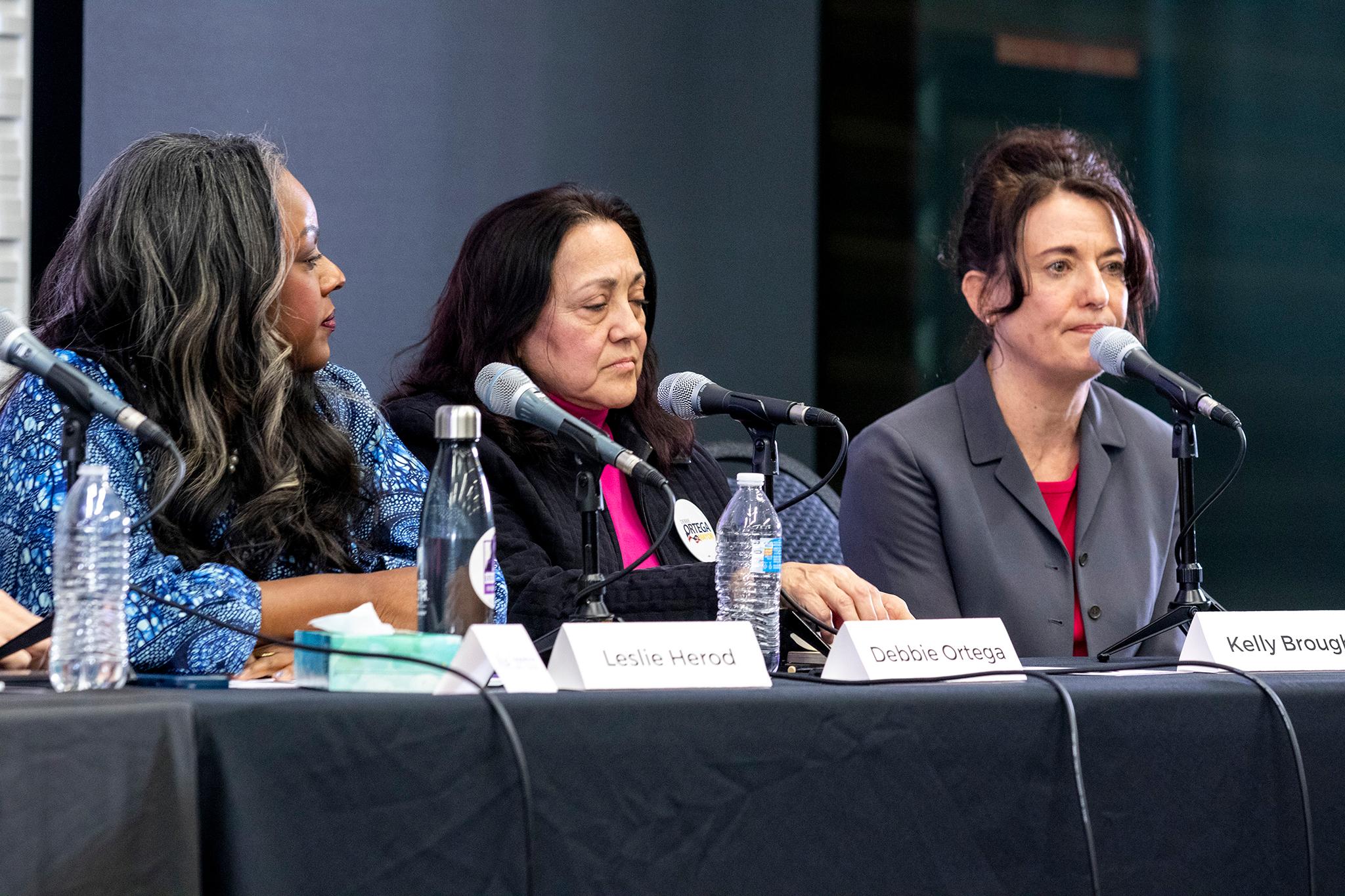
Herod said the question asked about housing is "really is about gentrification and how we can stay in our neighborhoods that we hold so dear, especially those with cultural legacies, industries that we want to be a part of."
She, too, would build on publicly owned land.
"In the first 100 days in my administration, I will talk to folks who have been recently displaced from Denver and say, 'What do you need to come back?' And deliver on that within the first term," Herod said.
Johnston talked about how the vast majority of teachers, nurses and public servants couldn't afford to live in Denver and he tried to address that with the Deerfield Fund, which attempted to close the gap between Black and white homeownership through down payment assistance programs.
"That's the kind of program I would expand citywide for us to make sure first-time first-generation homebuyers who don't have that wealth accumulated can get access to down payments they need to build that wealth."
Calderón asked whether it would make more sense for Johnston's "billionaire friends" to just give and invest money in communities of color.
Hansen argued the housing crisis is a supply problem.
"The reason we have displacement, increased rents and gentrification is fundamentally Denver's not been able to keep up with the supply of housing as a thousand people a month have moved here," he said. "By some estimates, we are more than 50,000 units behind. So we're going to need every tool in the toolkit to catch up."
As mayor, he'd work to drum up private, public and nonprofit solutions and investments in housing.
Spearman, who has not held elected office, used his response time to jab at his opponents' legislative experience and ask them why they haven't fixed things.
"We've got to hold our politicians accountable," Spearman said. "It's not enough for people to just come in and say things."
His solution would be to go into neighborhoods, set goals with the community, publish those goals and have politicians hold themselves accountable.
Johnston defended his record. He talked about building a coalition of 260 statewide organizations to pass Proposition 123, which will dedicate hundreds of millions of dollars of state money into affordable housing and create 25,000 units of income-restricted housing over the next eight years.
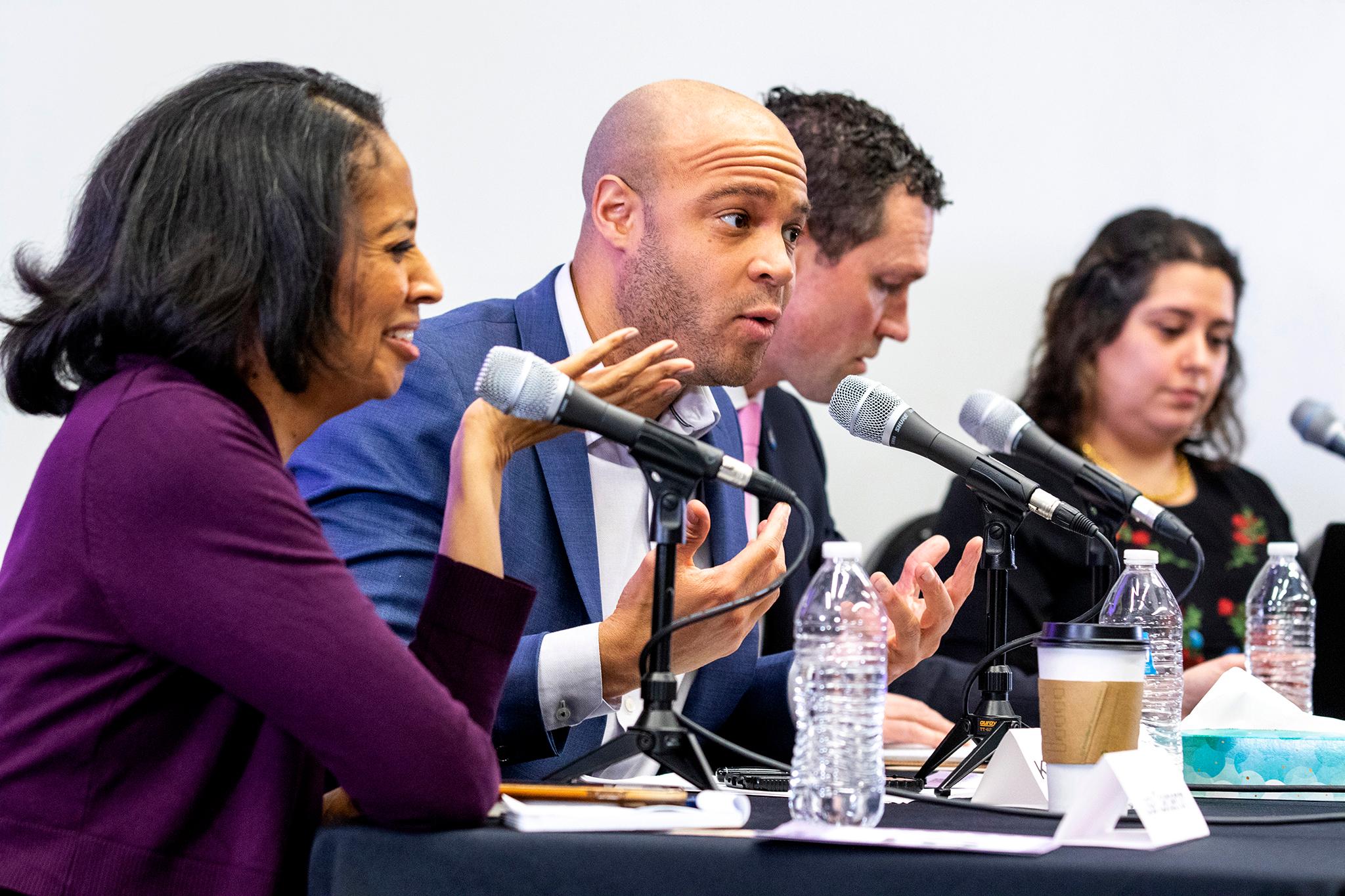
Spearman swiped back, accusing Johnston of representing a "majority-minority district" when he was a senator that was once a largely Black part of town and which has become increasingly white.
"That's unacceptable," Spearman said. "Now I understand that you've got flowery things to say about how you're going to improve it, but you did not serve your residents the way that you should have. And if you had, those neighbors wouldn't be having the problems that they're experiencing."
Johnston clapped back, noting Spearman had only returned to Denver in the past few years. "You couldn't run on what you've actually done in Denver, so you're trying to tear everyone down for what they've actually done. If you want to know what we've actually done, it is actually build a coalition to deliver statewide results on affordable housing."
Calderón described her previous fights against displacement.
"When I ran in 2019, this was the number one issue," she said. "Black and Brown folks were the top displaced communities in the nation. And I couldn't get our public officials to listen to us to see that our proverbial house was being burned down because we were losing our people."
She argued there is too much focus on individual homeownership and not enough on systemic change. She would create a social housing development authority. She pointed to Seattle, whose city government has entered the housing creation business, and said she wanted to do something similar.
The GES Coalition raised a question about a part of the neighborhood, city-owned land dubbed the triangle that is slated to be used in the redevelopment of the National Western Complex.
Some in the community want to take back the land and create collectively owned affordable housing and space for locally owned businesses run by people of color.
Calderón not only supported that, but said she had already worked on the issue when she served as District 9 Councilmember Candi CdeBaca's chief of staff.
"The community is tired of getting crumbs," Calderón said. She criticized Ortega for supporting a bond to build an arena for the Stocks Show at the National Western Center and said people needed housing, not another entertainment complex.
"Through the Social Housing Development Authority, we could then sell bonds," Calderón said. "We could then give the land to the community to manage, so that the city isn't overly managing what should be something that is led by the people."
Spearman said under his administration, people in neighborhoods would form juries that would offer perspective on what sort of architecture and environmental needs the community has. Density is necessary, he said, adding that he would build it in collaboration with neighborhood residents.
Hansen said he would "super-empower" neighborhoods, registered neighborhood organizations and other community groups to take their future into their own hands. He'd explore the legal mechanisms to give ownership of the land to the community and expand that model to other neighborhoods.
Johnston also supported community ownership of the land. He said he would also create neighborhood investment trusts, which would ensure the community-owned the land and that people who lived there before the development occurred could have ownership over the project.
"So as the project grows in value, they would actually get to receive the dividends for the profits from the neighborhood project," Johnston said.
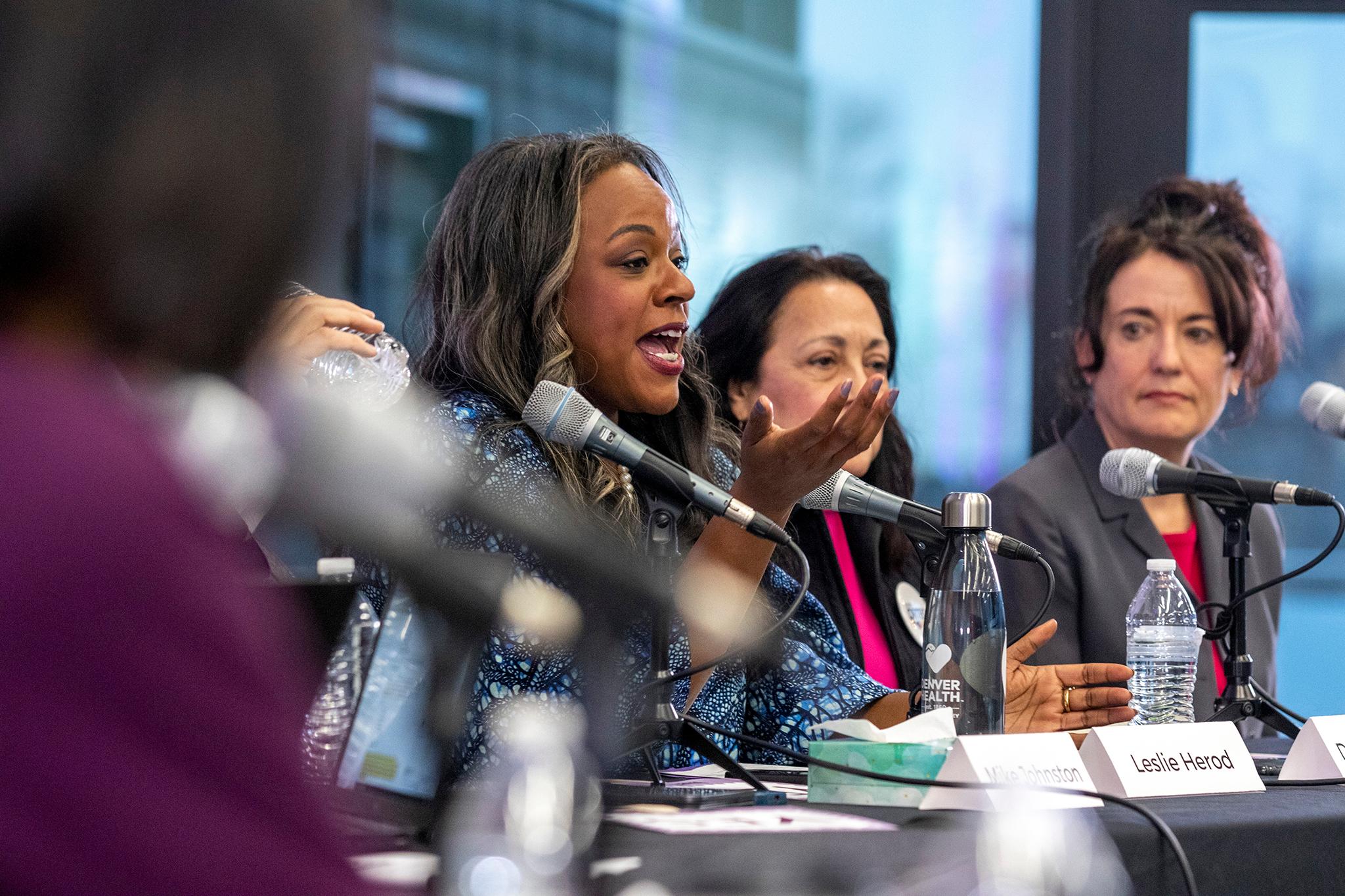
Herod acknowledged the land the forum took place on was stolen. She supported the GES Coalition in collective ownership and cautioned her fellow candidates to focus on the community and people rather than just numbers and policy.
Ortega said that private developers have tried to develop the triangle and couldn't because of the environmental cleanup needed.
"So if a private developer couldn't do it with, you know, their wealth of resources, I'm not sure how our community would be able to do it unless they access other resources," she said.
Ortega didn't speak at length about community ownership, but she did discuss other residential projects she's supported in Globeville and Elyria-Swansea and the importance of down payment assistance for individuals.
Brough described herself as " a strong supporter of land banking and land trusts" and pledged to work with the residents who wanted to create housing and retail at the triangle. She also talked about using federal dollars from the Inflation Reduction Act and Infrastructure Jobs Act to fund Globeville and Elyria Swansea efforts.
Candidates addressed both increased public safety and over-policing in communities of color.
Brough said she'd expand the Support Team Assisted Response (STAR) Program that sends public health and social workers to emergency calls in place of armed officers by 50% or possibly double it. She said she'd work with the community to address over-policing while giving officers the resources they need.
Ortega said both guns and drugs are killing people in the city. Rec centers need to become the "go-to place" like they were decades ago, she said, and that sports leagues should be created to send youth outside their neighborhoods to meet young people in other parts of the city. She also wanted to focus on job creation for young people.
Herod spoke about the impact of mass incarceration on Black people and the three decades her sister spent in and out of prison while dealing with addiction. Herod promised to continue to fight against War on Drugs policies.
"They want you to believe that they understand mass incarceration, while at the same time talking about incarcerating folks who are living on the streets unhoused," Herod said. "Who is that going to disproportionately impact?"
Johnston would train law enforcement in de-escalation techniques and expand community policing.
"We want to make sure we are recruiting far more public servants from the communities that they are policing," Johnston said. He would have more officers walking their beats and having relationships with small businesses and neighbors.
Johnston also believes different emergency situations require different types of responders. Mental health crises should be addressed by mental health professionals. Overdoses should be addressed by paramedics. Police should address theft.
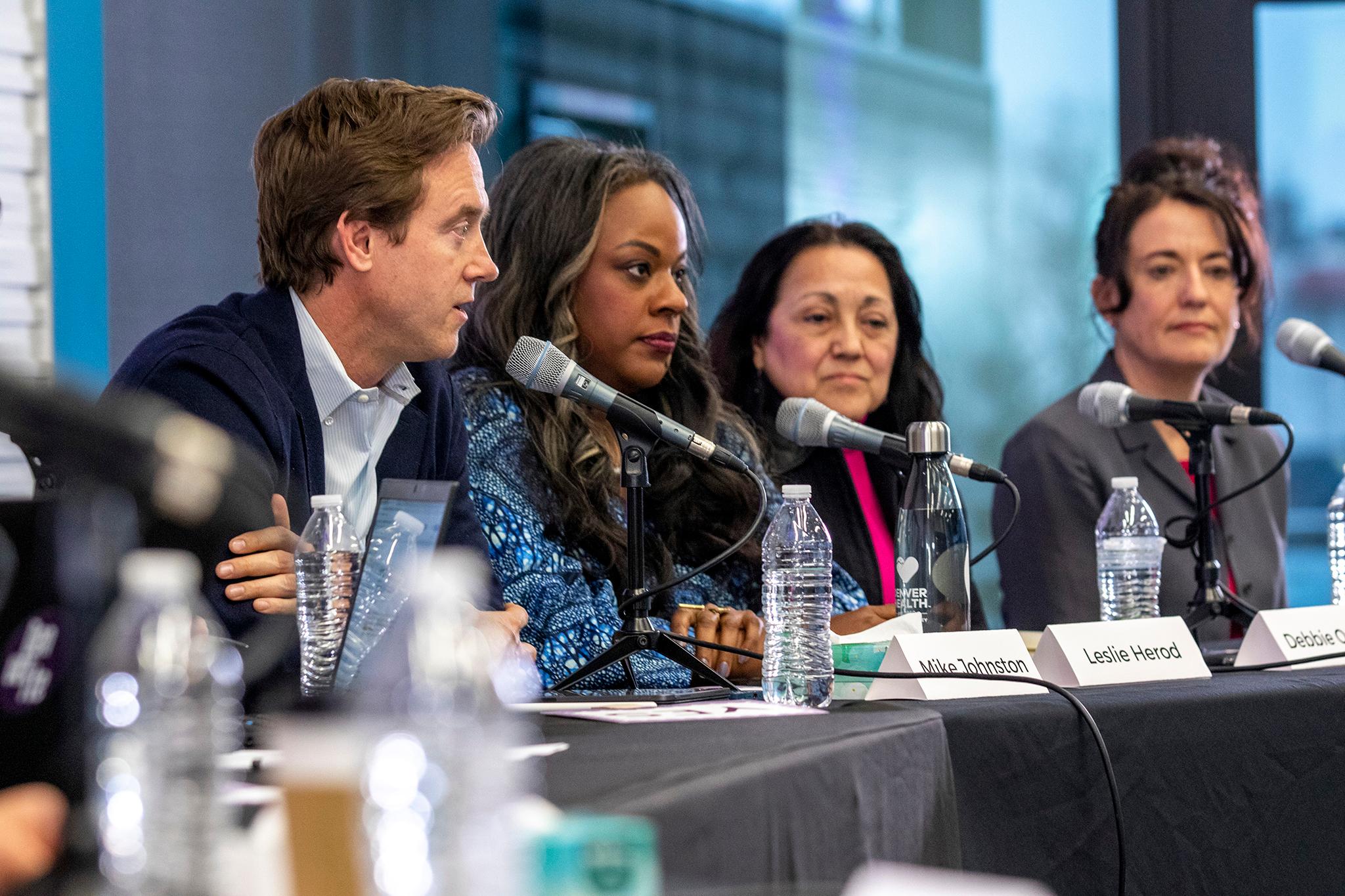
For Hansen, rebuilding the Department of Public Safety is his number one priority.
"We're hundreds of officers short at DPD," he said. "We are hundreds of officers short within the Sheriff's Department. And if we don't rebuild a great public safety department, all of our other plans and our other departments are not going to function. This is the number one job for the next mayor."
Spearman spoke about safety issues in neighborhoods and pointed toward laws passed that he said make it harder for police to do their jobs.
Herod, whom Spearman has criticized by name in a previous debate, used the critique as a chance to defend her record on criminal justice reform.
"I want to make clear that I am proud of the work that we did to pass police accountability right here in Colorado and led by the people of Denver," she said. "We met the moment when we saw the murder of George Floyd on our smartphones. We met the moment when we saw and heard Elijah McClain's mother call out for more action. We marched the streets together and said we will have this accountability."
Spearman clarified he wasn't speaking about police reform. He was addressing laws that decreased the penalty for low-level drug possession from a felony to a misdemeanor and defelonized the theft of cars that cost less than $2,000. Those thefts, in particular, affect low-income communities of color, he said.
Calderón said addressing safety issues requires personal experience. She spoke about being a criminal legal system professor at CU Boulder at the same time her own son was being assaulted by Denver police officers during the broken-windows policing era.
"If you did not know these were Democrats sitting up here, you would be shocked, because they sound like Republicans who want to take us back to the tough-on-crime and the war-on-poverty years. More police does not equal more safety for communities of color. It increases the risk to us in a different way. So my son was afraid of both gang members and police officers."
Calderón called on the city to "reimagine the institution of policing."
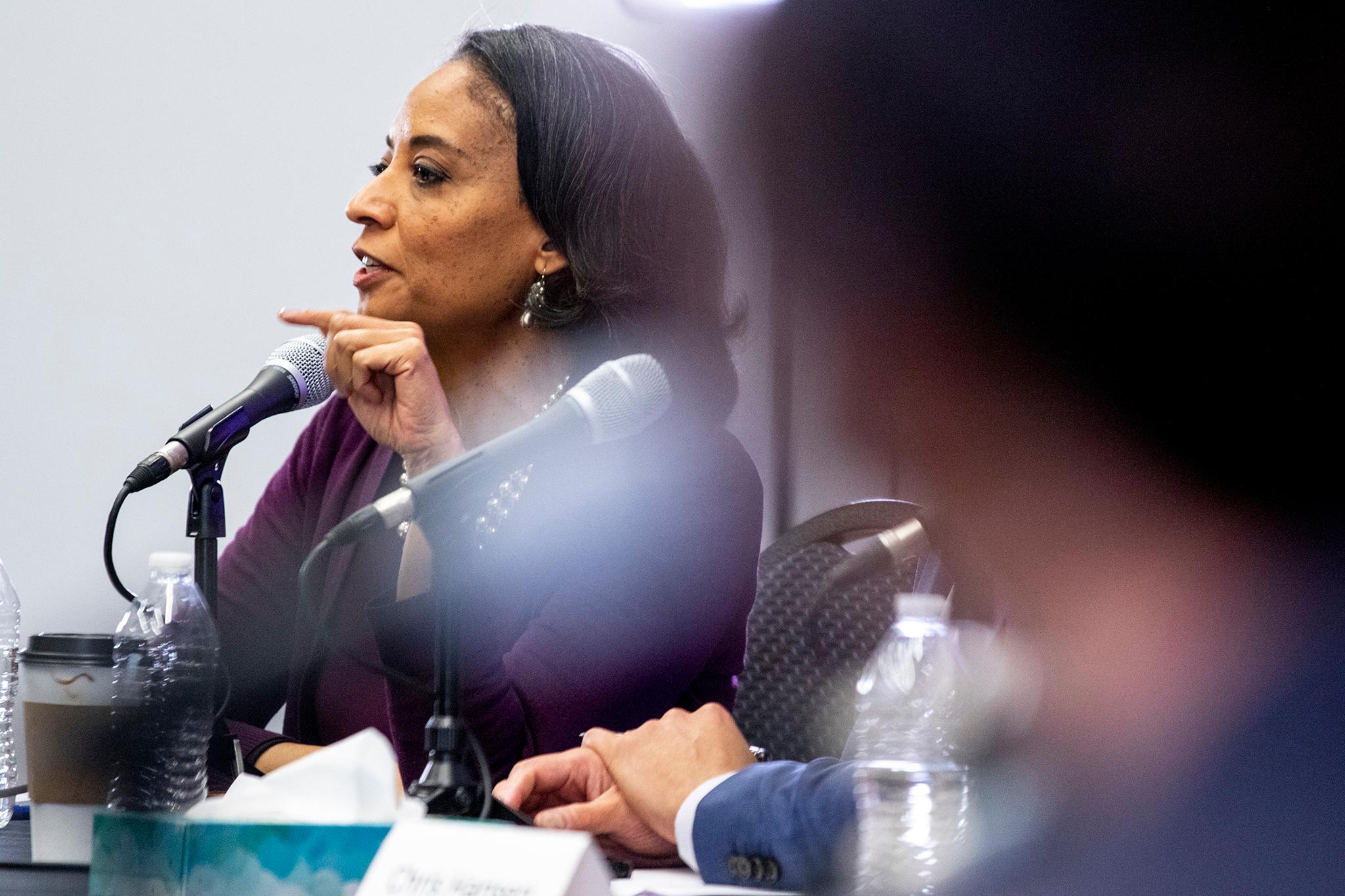
Brough said the best way she could illustrate how she would address safety is by talking about how she put together her safety policy. She brought together a former ACLU executive, a former manager of public safety and police office, and a former district attorney and governor to craft a position.
Calderón pushed back: "You tick off people who are supporting you, but you're not hearing the cries of mothers, of parents who fear for our children. I know those people as well. Good for you. I listened to these people. I listened to community. I listened to their stories. I've sat with them. I've held mothers who have cried after their children have been killed by the police. So this isn't about who is backing you. The community is who I look to, to back me."
The candidates addressed youth violence in the city.
Most candidates supported "common sense gun laws," including wait times for firearm purchases. Calderón spoke about rooting the city in communities, which she said can be hard when people are pushed out of the city.
Spearman made a case for increasing the number of police officers because Black and Brown communities disproportionately suffer when crime happens. To improve safety, the city needs to address the drug trade, he said.
Hansen talked about how youth violence affects his two children in Denver Public Schools and touted gun reforms he's passed, including a current effort to ban ghost guns, as part of the solution.
Johnston proposed providing youth with after-school and summer programs, intervening with family-based therapy when young people have been involved in crime, and pushing for "common-sense gun policy." He cited the high-capacity magazine ban and universal background checks as two policies he pushed.
Herod reminded people that the vast majority of guns youth have aren't bought in gun shops but are illegally sold. Kids are arming themselves because they are afraid, she said.
Ortega said the city needed to create more opportunities for community engagement between youth and police. She remembered the gang wars in the early '90s, when youth would cross neighborhood lines to shoot each other. She said she saw community policing work firsthand, citing programs where adults took kids who had never been out of the city to the mountains.
"I think we need to get back to having programs that engage with our kids because maybe the kids feel disconnected," she said.
Recently some East High School students came to City Council and said they want police back in the schools after a shooting outside the school.
"We should listen to them," Ortega said.
Brough said changing gun policy is crucial, but it's important to do it at the state and federal levels to be effective.
She also recalled being then-Mayor John Hickenlooper's chief of staff and opening the rec centers up for free to youth to deter violence. Focusing on programs like that, access to education, jobs and stable housing would be part of her solution.
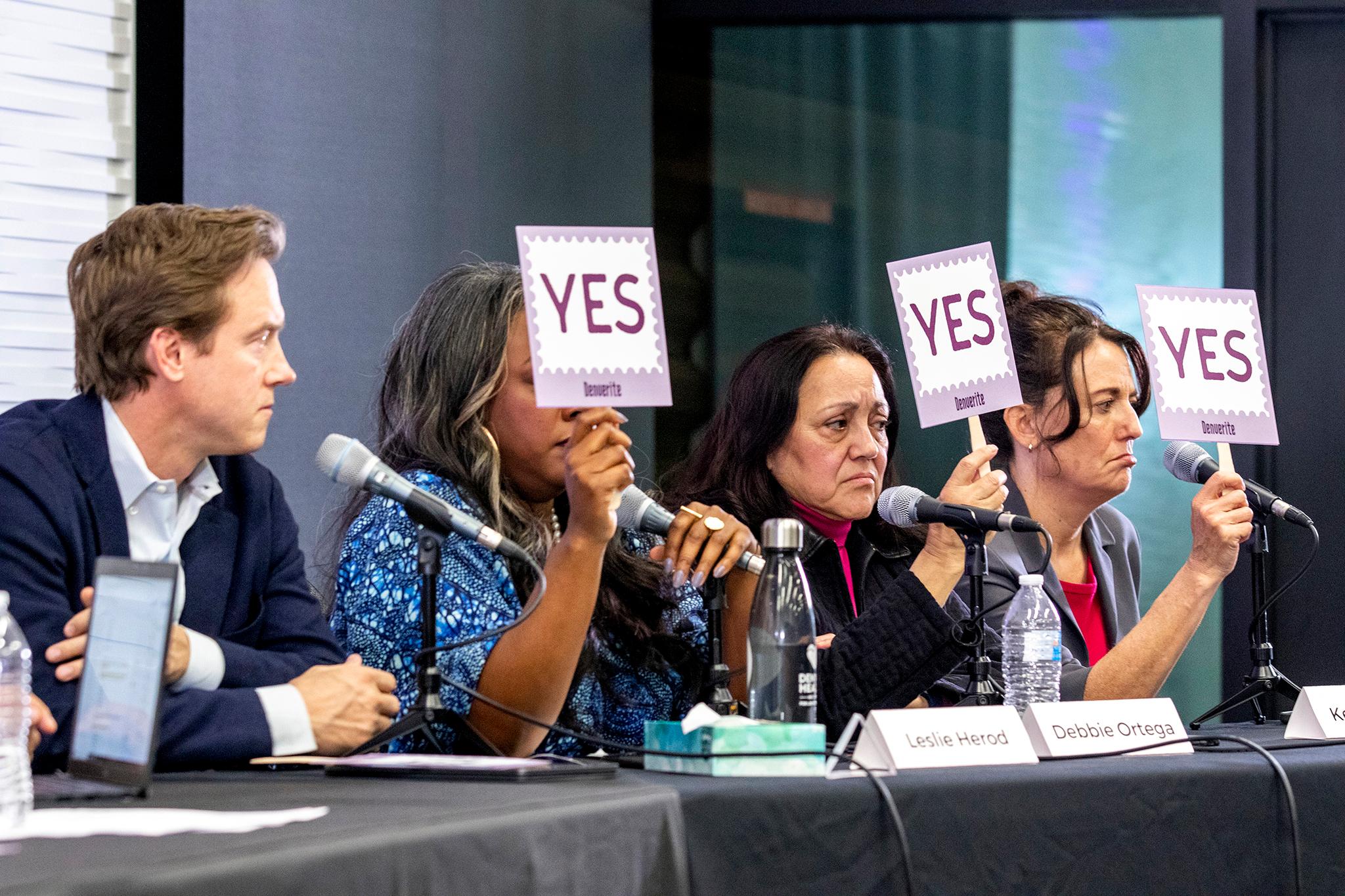
The conversation heated up around homelessness.
Brough talked about her regional strategy for ending encampments which involves setting up more sanctioned outdoor safe sites where people can access wrap-around services while the city builds more shelter and housing. She also acknowledged she would have police arrest people who resisted services.
"I will not leave people to fend for themselves on our streets," she said. "I will arrest people to get them to a safer location."
Ortega said she'd collaborate with neighboring jurisdictions on setting up treatment for people dealing with addiction. Finally, she'd focus on creating single-room-occupancy housing in the city that is cheaper to build and community oriented.
Herod took on Brough and others who supported arresting unhoused people.
"I will not incarcerate people simply because they're homeless," Herod said. "They want you to believe that this is a compassionate response for people living on the street. It is not. Going back to equity, you're talking about incarcerating people because the system continues to fail them, and we refuse to do what was right to provide housing, resources and services and maybe even help."
She said the money spent housing people in the jail would be better used securing actual housing.
"Denver jail does not want to be an internment camp for the unhoused population," she said. "How about instead, we get people housing."
Johnston, who raised skepticism when he promised to end homelessness in his first term, said the solution is building "safe, dignified, stable housing." His idea? Microhome villages where entire encampments can move without disrupting their social network.
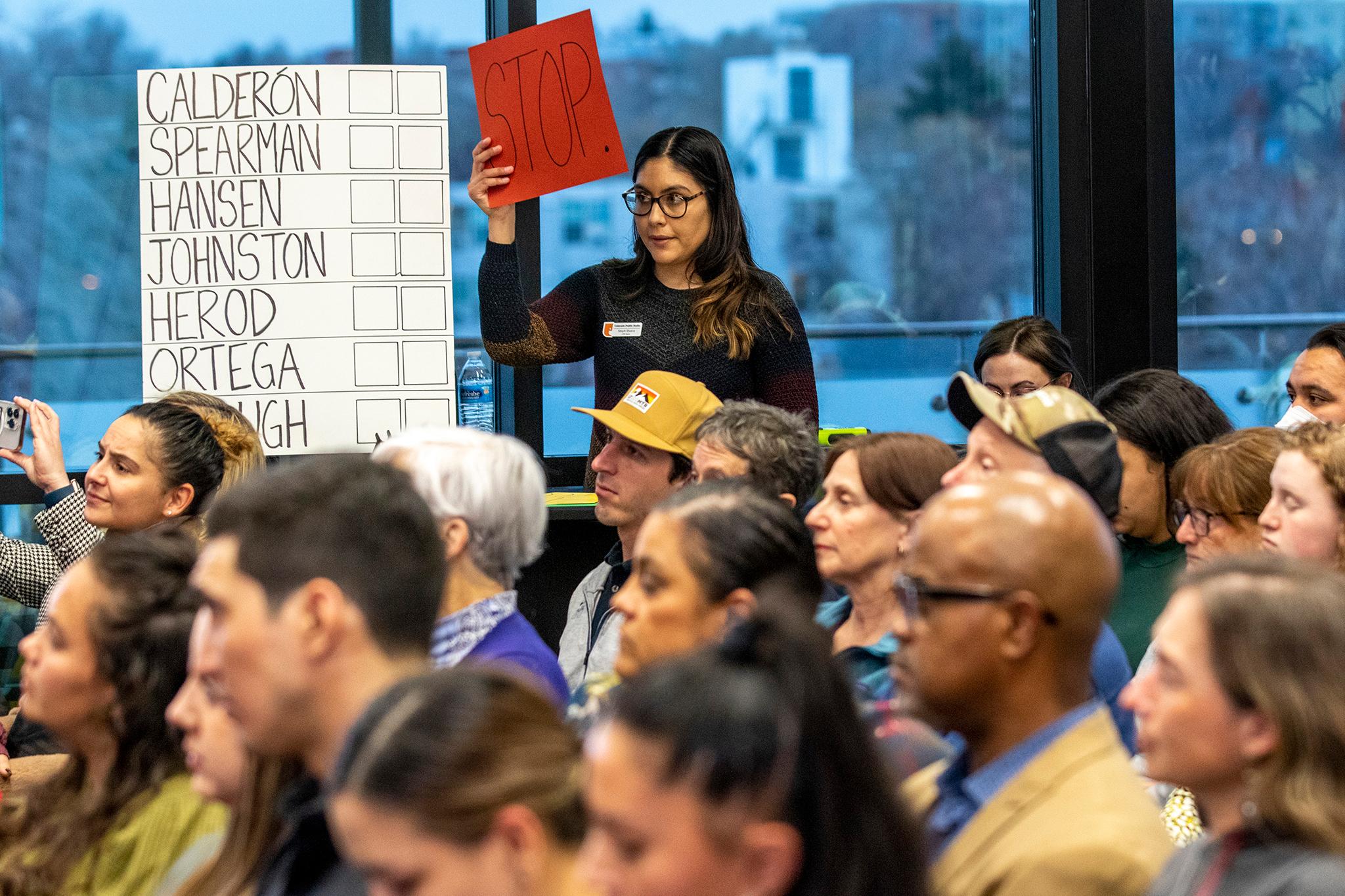
Hansen also said he believes homelessness is solvable. But Denver faces a financial cliff, as federal money dries up. The city must audit the $250 million a year spent on homelessness and focus on what's working.
"We've got to be very smart about how we're spending our money right now," he said, citing legislation he's passed on investing more state money in addiction treatment and recovery programs.
Spearman said the city needs to create more innovative services for those the system is failing.
"We've also got to acknowledge an incredibly dark truth that because we are not enforcing our laws, we have become a magnet for people who want to be chronically homeless," he said. "With all due respect, the sweeps do work."
Calderón took on her opponents for failing to think about equity when addressing homelessness. She said she was confused by Brough, who was "flip-flopping," at once saying she opposed the camping ban and that she would arrest people who refused services. Calderón took on Hansen and Johnston for saying they supported the camping ban but were careful not to talk about arresting people.
"At least Kwame is honest," Calderón said. "He wants to sweep people and arrest people."
He nodded in agreement.
Candidates were asked where environmental racism is playing out in the city.
Calderón talked about suing Suncor Refinery for spewing toxins into the air.
Spearman said he'd take a neighborhood approach to the issue and use the Environmental Protection Agency to combat pollution while leaning into the green economy, micro-mobility and cleaner construction across neighborhoods.
Hansen talked about his record in the Statehouse, pushing bills to close coal plants. He spoke about Denver's opportunity to speed up electrification, which he said will create tens of thousands of green jobs.
Johnston acknowledged poor air quality hits communities of color the hardest, and the city needs to aggressively fight for open spaces and parks in communities impacted by environmental racism. For him, fixing air quality means electrifying vehicles and the city fleet.
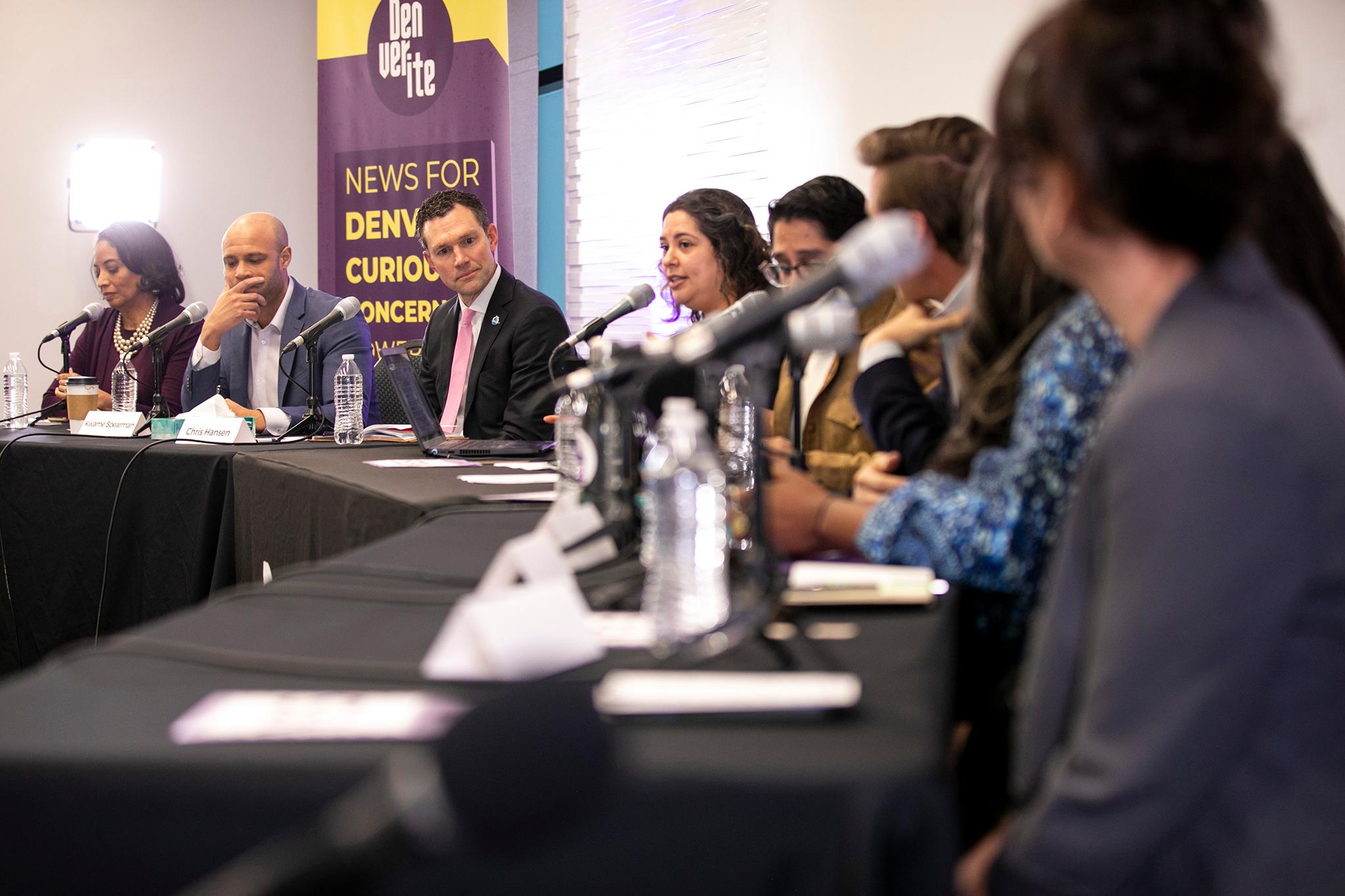
Herod also pushed for doing more to regulate Suncor and spoke about her own struggle with asthma.
"I can't go out in the summer on bad pollution days, because it's akin to smoking one or two packs of cigarettes a day," she said. "If I go outside, I know the impacts of environmental racism firsthand."
In addition to addressing environmental racism, the city needs to ensure communities of color have equitable access to healthcare.
"We've got to make sure that our health outcomes and our remedies align with the communities that are disproportionately impacted," she said.
Ortega talked about her leadership in the fight to shut down ASARCO and other environmental polluters in the Globeville Elyria Swansea neighborhoods. She also recalled advocating for environmental mitigations after the city decided to move forward with massive renovations on I-70. She, too, supported electrification.
Brough committed to investing at least 50% of federal climate action money into communities disproportionately affected by environmental racism.
Candidates also addressed how they would tackle behavioral health, substance abuse and other health-care issues among all Denverites -- housed and unhoused alike.
"I would focus on bringing together public, private and nonprofit sectors to really do this work and partnering in a way that we haven't really done in our past," Brough said. The city itself would fund some of this work.
Ortega talked about the Caring for Denver program, which Herod chairs, that funds behavioral health organizations. She also talked about reevaluating which institutions get most of the funding.
Herod also talked about Caring for Denver and how funding from the program helped create the STAR program.
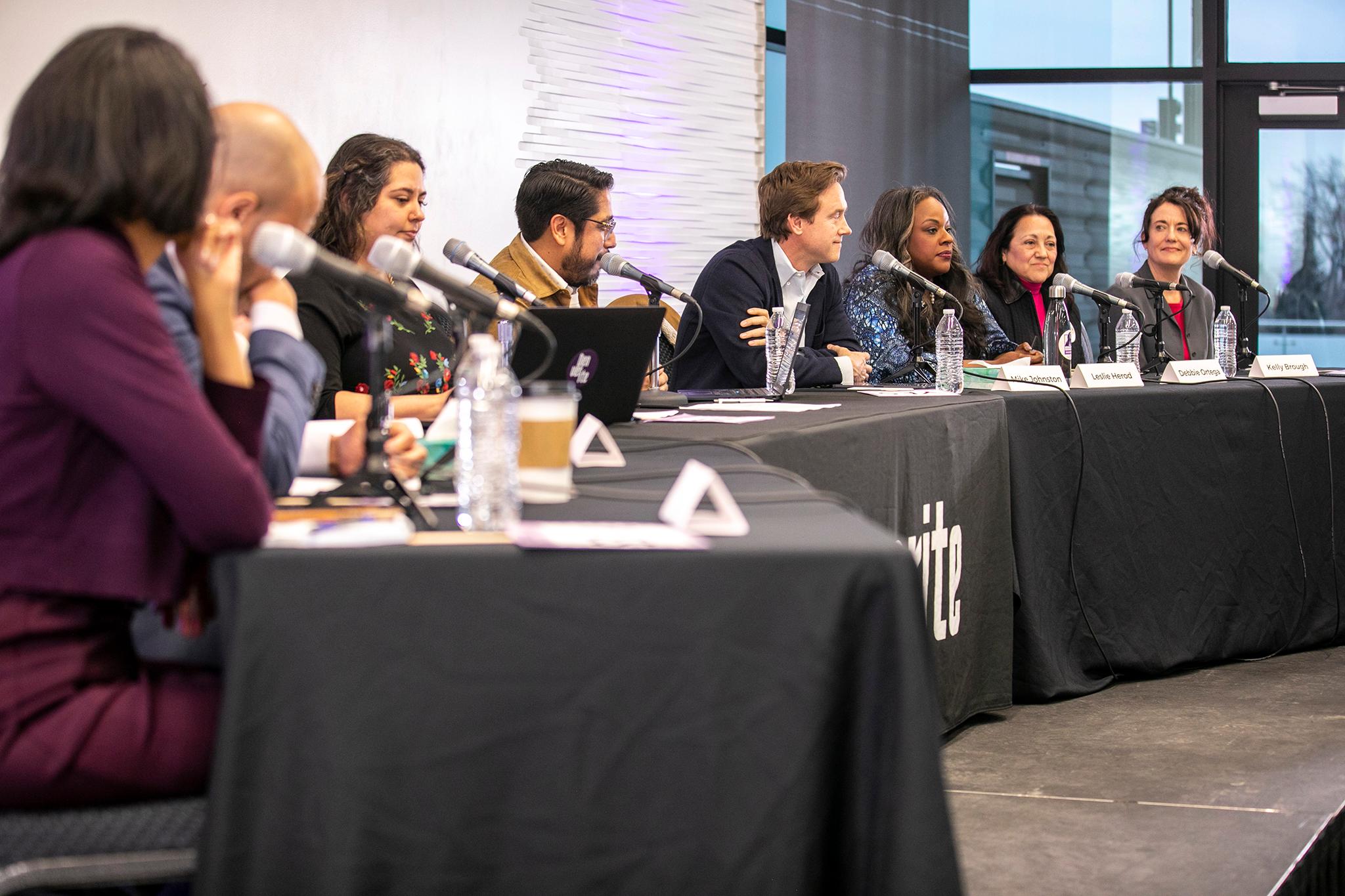
Johnston acknowledged the mental health crisis young people are facing and proposed expanding funding for Denver Health and ensuring all high schools have money to hire counselors.
He also proposed shutting down two units at the jail, turning one into an in-patient mental health facility and the other into a center for addiction treatment.
Hansen described a massive financial shortfall Denver Health faces and said the city needs to find a sustainable financial model to fund it.
"Denver Health is the emergency room for the city," he said. "It is the first point of contact for many of the folks that need mental health and addiction support. We have to shore up Denver Health, make it sustainable, or the city cannot work."
Spearman said Denver needs to offer wraparound services in neighborhoods. Now that Colorado has legalized psilocybin, Denver should consider alternative solutions for addressing mental health issues.
"The other thing we've got to do is help our unhoused neighbors deal with this," Spearman said. "We've got to have both voluntary and involuntary help on this issue."
Calderón talked about her work as the head of the Community Reentry Project creating policy on how women should be treated in jail and helping redesign the facility to be responsive to address women's needs.
"Providers need to be supported," Calderón said. "The city has this terrible pattern of pushing off its problems to providers and not adequately funding them."
Community activist Ean Thomas Tafoya was also invited, but chose not to attend due to a schedule conflict. Tafoya's campaign said he was at a national gathering with other climate advocates in his role as State Director for environmental advocacy group Green Latinos.
"They're organizing to ensure the Build Back Better and Infrastructure Act funding makes it to our Denver communities and improves the lives of Denver's residents. Ean regrets he couldn't be here tonight but can't wait to be back in Denver in a few days," the campaign said in a statement.
What's next?
Denverites will vote on their next mayor on April 4. Ballots will be sent out next week.
If no mayoral candidate receives more than 50% of the vote, there will be a run-off election between the top-two vote getters.
Check out Denverite's voter guide here.
Watch the full People's Forum here!
Correction: An earlier version of this story stated the triangle was acquired to make way for I-70. Instead, the land is owned by the city and was slated to be used in the redevelopment of the National Western Complex. We regret the error.

